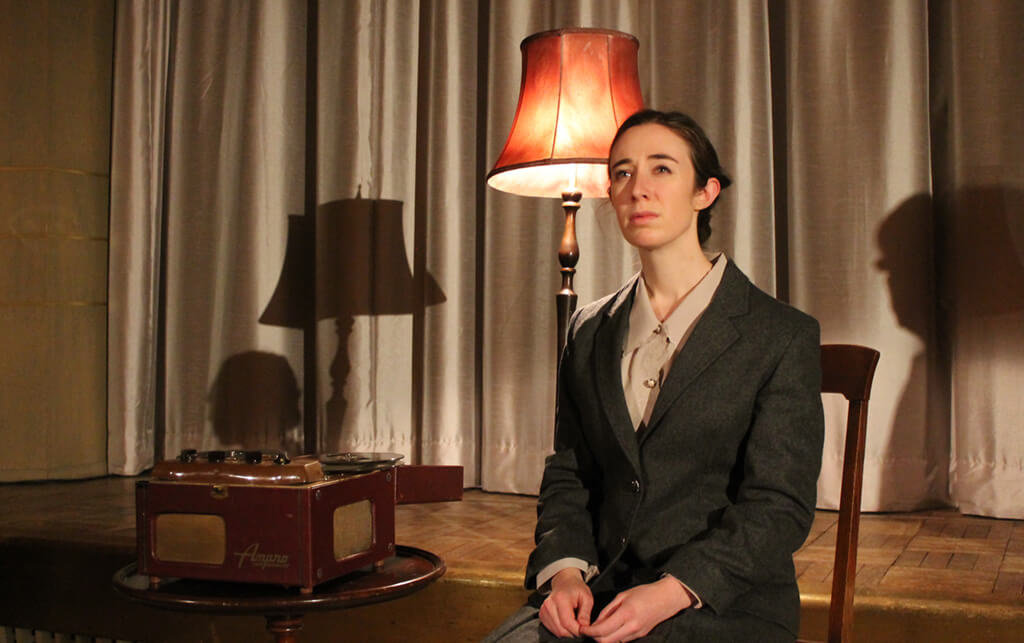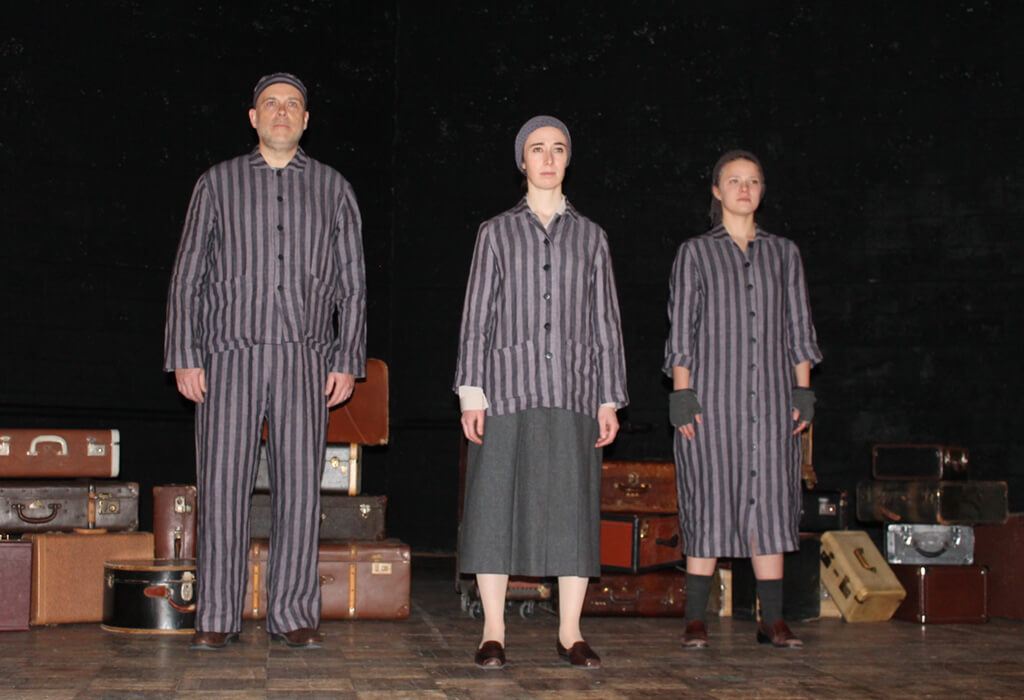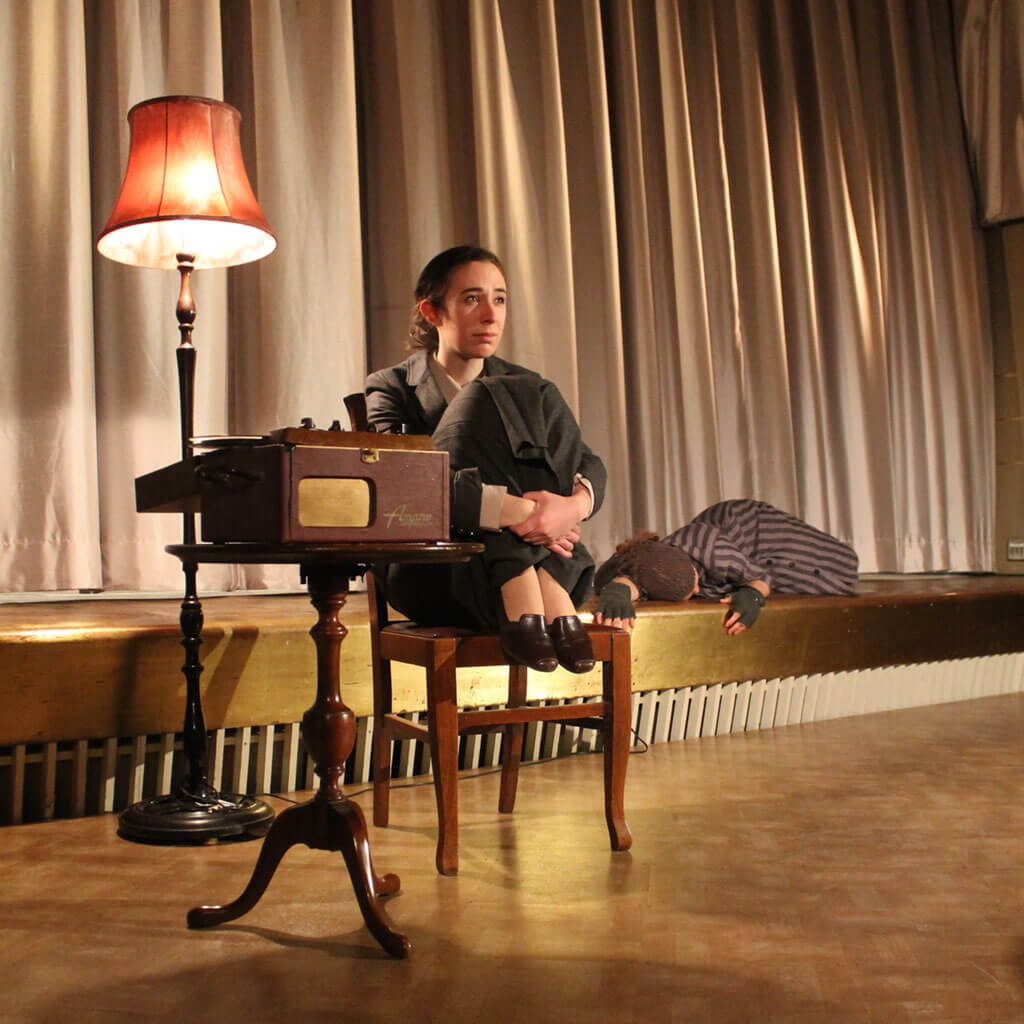
An audience member’s remark that soprano Sara Schabas’ performance was “very powerful,” and then the audience’s spontaneous eruption into applause nicely summarises the Canadian premiere of Jack Heggie’s two one-act operas Another Sunrise and Farewell Auschwitz. This round of applause occurred not during the bows, but during the Talk Back after the show with Schabas and director Aaron Willis. At first glance, this seems like a loving display of community in Beth Tzedec toward the Electric Bond Ensemble on Saturday. But, it can also be read as ironic alongside these provocative works.
As seen in the preview to these operas, Another Sunrise gives us a glimpse of Krystyna Zywulska, a Polish Resistor, hidden Jew and Holocaust survivor’s attempt to retell her time at Auschwitz. To stay alive, she would beat and take the belongings from arrivals before they were gassed. She tries to explain that “a survivor is not a hero,” but simply a survivor. Because Willis’ production attempts remove the divide between the stage and the audience using a thrust stage and having women in the congregation dressed as Zywulska’s victims, it was uncomfortable to applaud Schabas’ portrayal of this “survivor.” However, one cannot deny that the performance she gave in this physically and emotionally demanding one woman shown was nothing short of heroic.
Although Sara Schabas’ voice doesn’t have the most distinctive timbre, she more than compensated for this with her intelligent musical portrayal of the Polish Krystyna Zywulska. Having seen her in Tapestry’s Bandits in the Valley, Schabas surpassed my expectations in these operas as both an engaging actress and singer. Schabas’ singing demonstrated her mastery of English lyric diction. She sang each word clearly and with the perfect balance of operatic grandeur and humanity. This translated perfectly into Heggie’s compositional style.
With Another Sunrise, Heggie reveals himself once again as a synthesizer of opera’s more extreme styles and popular taste. The opera begins with open chords on the piano (musical director Michael Shannon) paired with eerily chromatic lines played by the rest of the chamber ensemble composed of violin (Mark Skazinetsky), cello (Igor Gefte), bass (Michael Chiarello), and clarinet (Eric Braley). As if Heggie is trying to tell us that a pertinent Jewish story is about to unfold, the opening sounded like a combination of an orchestra tuning and Jewish klezmer music.
Heggie cleverly expands the atmosphere of unease by using tuneful themes that are passed between the voice and the orchestra. These reminiscent themes make us feel as if we are travelling the expanse of Zywulska’s life, despite only watching it for half an hour. The themes are usually set over oscillating or pulsating accompaniments to give a feeling movement, much like a Broadway song.
One of the most poignant musical themes signified the canyon where the gassed bodies were burned. This motif returns at the end when Zywulska says “I just saw another sunrise.” It is at this moment that Willis, as well as set and costume designer Jennifer Goodman, make the most genius and controversial directorial change to the operas, considered untasteful by some members of the audience.

As the canyon motif returns, Schabas walked from the thrust where she was within the contemporary audience, through the proscenium arch into a recreation of the room next to the crematorium where Zywulska worked.
Without a break for applause the next opera begins, Farewell Auschwitz. What is at first simply an opera composed of Zywulska’s poems written while in Auschwitz and set to popular music styles of the period, are now imbued with Zywulska’s post-traumatic revelations. What makes this transition so disturbing is that the music is no longer serious and sympathetic as we would expect, but tongue-in-cheek humour, arguably what those living in these camps would have used to endure the horrors they saw each day.
We leave the presumed uneasiness of Another Sunrise to hear a doo-wop group playing non-existent instruments because they had no possessions in Auschwitz. As testified by the awkward clapping at the end of each number, we no longer know whether to laugh, cry, or congratulate. Because the levity and intimacy of the previous opera was brought through the proscenium arch with Schabas, this seemingly simple concert of songs is reinterpreted as Zywulska’s actual past, rather than entertainment.
For me, the audience’s indecision was the point of these pieces. We can no longer sympathize with these characters’ experiences as we have been taught by lectures on the Holocaust. Instead, we are faced with a more uncomfortable reality of how these prisoners got by each day, through laughter rather than sadness. These light-hearted songs were accompanied by lyrics such as:
“stand with me and hold your shaved heads high”
“yes it really happened, we were there”
“Farewell Auschwitz, our song will linger”
Joining Schabas for Farewell Auschwitz were mezzo-soprano Georgia Burashko and Bass-baritone, Sean Watson, both of whom gave committed performances. They portrayed a vulnerability and innocence with their voices, rather than being operatic per say, that was very effective. Shannon expertly led the chamber ensemble from the piano. In the very intimate space of Herman Hall, the ensemble sounded stunning and immediate making the performance feel all-consuming.

In the post-concert chat, Schabas mentioned that Heggie added a third opera to this set called For a Look or a Touch. Using journal entries by Manfred Lewin, this opera follows the not often discussed persecution of homosexuals. Heggie has reworked these three works to create one large opera called Out of Darkness. Although I do not know what changes Heggie made to combine these opera, I believe Willis and Goodman might find a very powerful and chilling solution to unify these works. With this combination of talent, I for one can’t wait to see what the Electric Bond Ensemble will perform next.
LUDWIG VAN TORONTO
Want more updates on Toronto-centric classical music news and reviews before anyone else finds out? Follow us on Facebook or Twitter for all the latest.
![]()



